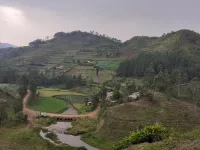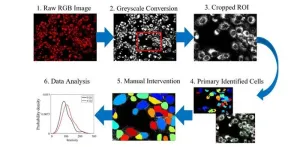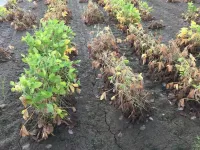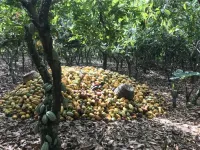(Press-News.org) A new international study highlights the severity of climate change impacts across African mountains, how farmers are adapting, and the barriers they face – findings relevant to people living in mountain regions around the world.
"Mountains are the sentinels of climate change,” said Julia Klein, a Colorado State University professor of ecosystem science and sustainability and co-author of the study. “Like the Arctic, some of the first extreme changes we're seeing are happening in mountains, from glaciers melting to extreme events. There's greater warming at higher elevations, so what's happening in mountains is foreshadowing what's going to happen for the rest of the world.”
Global studies have shown that temperatures are rising more rapidly in mountain regions than at lower elevations, but there has been a lack of climate data for African mountains. To start to fill this gap in information, researchers interviewed 1,500 farmers across 10 African mountain regions to understand how the climate has changed, the impacts those changes are having on local livelihoods, and how farmers are adapting.
Mountain regions in Africa are home to 228 million people, but many more rely on water and food from these areas.
"Many people in Africa depend on the water and crops provided from these mountain systems – in the mountains but also in the lowlands and cities,” said lead author Aida Cuni-Sanchez. “We must find solutions for these farmers as climate change impacts will only get worse over time.”
Cuni-Sanchez, an associate professor at the Norwegian University of Life Sciences and the University of York (UK), was inspired to study this topic using a participatory approach based on her postdoctoral research at Colorado State University. During that time, Cuni-Sanchez joined the Mountain Sentinels, a network of academics, Indigenous rights holders, mountain communities, and non-governmental organizations focused on mountain sustainability. The Mountain Sentinels network is funded by the National Science Foundation and has members in 56 countries, including 10 African countries.
The study found similarities in climate changes and impacts across mountain ranges in all eight countries studied – Cameroon, Ethiopia, Uganda, Rwanda, Burundi, Democratic Republic of Congo, Kenya, and Tanzania. Farmers reported increased temperatures, reduced fog, changes in rainfall amount and distribution, and an increase in extreme climate events. The most widespread climate-related impacts were lower crop yields and livestock production, increased pests and diseases, reduced human health and water availability, and more soil erosion.
Farmers adapted by changing planting dates, adopting new crop varieties, increasing use of soil conservation techniques and inputs, like fertilizer and pesticides, and using more veterinary care. Some also were working to diversify their income sources.
Most adaptation was incremental – farmers made small changes to their normal processes rather than changing livelihoods – and wealthier households were better able to adapt by trying more than one strategy.
Violent conflicts hindered adaptation in some areas of Cameroon and the Democratic Republic of Congo, where market access, mobility, and economic opportunities for alternative livelihoods were limited.
Access to credit, technical skills and markets would help farmers better adapt to climate change, the authors stated, as well as increased knowledge exchange among local communities and external actors. For example, some programs promote climate adaptation by distributing drought-resistant seeds but do not support farmers when they have questions, so the seeds are discarded or abandoned after planting.
"People are taking actions to adapt the best they can, but they are facing some challenges, often government policies that have negative unintended consequences for mountain people,” Klein said, adding that policies often are made by people living elsewhere who may not understand the local social or cultural context.
For example, in Rwanda, the government promotes the cultivation of maize and beans but discourages cassava and sorghum, crops perceived by local farmers as being more drought tolerant.
"In most African mountains, there are no meteorological stations or long-term records of crop yields. Just because changes have not been recorded, it doesn't mean they did not take place,” Cuni-Sanchez said. “We approached farmers’ perceptions and their Indigenous knowledge as living records of past changes, and we show that there have been numerous climatic changes and impacts in all mountains studied. We hope that our approach inspires researchers and practitioners working in other data-deficient regions, as climate change is affecting us all.”
This approach is a core principle of Mountain Sentinels, which centers the knowledges of local and Indigenous mountain communities and helps to co-create solutions to their challenges.
"We need to think about every data point as a human being, as a family, trying to provide for themselves and for the next generation,” said Klein, founder of the Mountain Sentinels network. “It's our responsibility to these people to act.”
The paper, published in Nature Climate Change, and an accompanying policy brief recommend involving community members in co-designing solutions that work for them. The policy brief, by Cuni-Sanchez and the Basque Centre for Climate Change, outlines several priorities for moving forward locally driven and culturally appropriate adaptation strategies in African mountain regions.
END
Study examines how African farmers are adapting to mountain climate change
2025-02-03
ELSE PRESS RELEASES FROM THIS DATE:
Exposure to air pollution associated with more hospital admissions for lower respiratory infections
2025-02-03
Air pollution is a well-known risk factor for respiratory diseases such as asthma and chronic obstructive pulmonary disease (COPD). However, its contribution to lower respiratory infections —those that affect the lower respiratory tract, including the lungs, bronchi and alveoli— is less well documented, especially in adults. To fill this gap in knowledge, a team from the Barcelona Institute for Global Health (ISGlobal), a centre supported by the ”la Caixa” Foundation, assessed the effect of air pollution ...
Microscopy approach offers new way to study cancer therapeutics at single-cell level
2025-02-03
Understanding how tumors change their metabolism to resist treatments is a growing focus in cancer research. As cancer cells adapt to therapies, their metabolism often shifts, which can help them survive and thrive despite medical interventions. This process, known as metabolic reprogramming, is a key factor in the development of treatment resistance. However, current methods to study these changes can be costly, complex, and often destructive to the cells being studied. Researchers at the University of Kentucky have developed a new, simpler approach to observe these metabolic shifts in cancer cells, offering a more accessible and effective tool for cancer research.
As ...
How flooding soybeans in early reproductive stages impacts yield, seed composition
2025-02-03
FAYETTEVILLE, Ark. — With an increasing frequency and intensity of flooding events and an eye to capitalize on a common rice production technique, soybean breeders are on a quest to develop varieties with flood tolerance at any stage in the plant’s development.
Farmers who use zero-grade fields for rice as their main production system are also interested in flood-tolerant soybean varieties for crop rotation, said Caio Vieira, assistant professor of soybean breeding and a researcher for the Arkansas Agricultural Experiment Station, the University of Arkansas ...
Gene therapy may be “one shot stop” for rare bone disease
2025-02-03
For the last 10 years, the only effective treatment for hypophosphatasia (HPP) has been an enzyme replacement therapy that must be delivered by injection three-to-six times each week.
“It's been a tremendous success and has proven to be a lifesaving treatment,” said José Luis Millán, PhD, professor in the Human Genetics Program at Sanford Burnham Prebys. “Many children who have been treated otherwise would have died shortly after birth, and they are now able to look forward to long lives.
“It is, however, a very invasive treatment. Some patients have reactions from frequent injections and discontinue ...
Protection for small-scale producers and the environment?
2025-02-03
Sustainability certificates such as Fairtrade, Rainforest Alliance and Cocoa Life promise to improve the livelihoods of small-scale cocoa producers while preserving the biodiversity on their plantations. Together with the European Commission's Joint Research Centre, researchers from the University of Göttingen have investigated whether sustainability certificates actually achieve both these goals. To find out, they carried out an analysis within the Ghanaian cocoa production sector. Their results show that although certification improves both cocoa yield and cocoa income for small-scale producers, they were unable to ...
Researchers solve a fluid mechanics mystery
2025-02-03
What began as a demonstration of the complexity of fluid systems became an art piece in the American Physical Society’s Gallery of Fluid Motion, and ultimately its own puzzle that the researchers just solved. Their new study is published in the journal Physical Review Letters.
“We came up with this experiment because we were having a hard time convincing people of certain effects happening for the problem of drag reduction,” said assistant
professor Paolo Luzzatto-Fegiz, an assistant professor of mechanical engineering, whose research specialties include modeling flow and investigating drag — as ...
New grant funds first-of-its-kind gene therapy to treat aggressive brain cancer
2025-02-03
The California Institute for Regenerative Medicine has awarded a $6 million grant to USC investigators pioneering a new first-of-its-kind genetic therapy for glioblastoma, a severe form of brain cancer. The treatment would be the first gene therapy for glioblastoma to use a novel, more precise delivery system that is less likely to harm non-cancerous cells.
Glioblastoma is an aggressive and fast-growing cancer originating in the brain that occurs primarily in adults and has no known cure. Patients diagnosed with this type of tumor have a five-year survival rate of just 5 percent. The cancer’s location—in the sensitive brain—combined ...
HHS external communications pause prevents critical updates on current public health threats
2025-02-03
The Society for Healthcare Epidemiology of America (SHEA) is concerned that two weeks have passed since the Department of Health and Human Services (HHS) announced a pause on mass communications and public appearances that are not directly related to emergencies or critical to preserving health. With the order remaining in effect until a new HHS secretary is confirmed, this unpredictable timeline prolongs uncertainty for both healthcare professionals and the public, and endangers the nation by hindering our ability to detect and respond to public health threats, such as avian influenza (H5N1). Public ...
New ACP guideline on migraine prevention shows no clinically important advantages for newer, expensive medications
2025-02-03
Embargoed for release until 5:00 p.m. ET on Monday 3 February 2025
@Annalsofim
Below please find summaries of new articles that will be published in the next issue of Annals of Internal Medicine. The summaries are not intended to substitute for the full articles as a source of information. This information is under strict embargo and by taking it into possession, media representatives are committing to the terms of the embargo not only on their own behalf, but also on behalf of the organization they represent.
----------------------------
New ...
Revolutionary lubricant prevents friction at high temperatures
2025-02-03
Through a multi-university collaboration, researchers at Virginia Tech have discovered a new, solid lubricating mechanism that can reduce friction in machinery at extremely high temperatures. It works well beyond the breakdown temperature of traditional solid lubricants such as graphite, and the findings were published in Nature Communications.
“This breakthrough solid-state lubricant could change how we design materials for high-tech engines, making them last longer and work better under extreme conditions,” said Rebecca Cai, associate professor in the Department of Materials Science and Engineering and one of the ...





